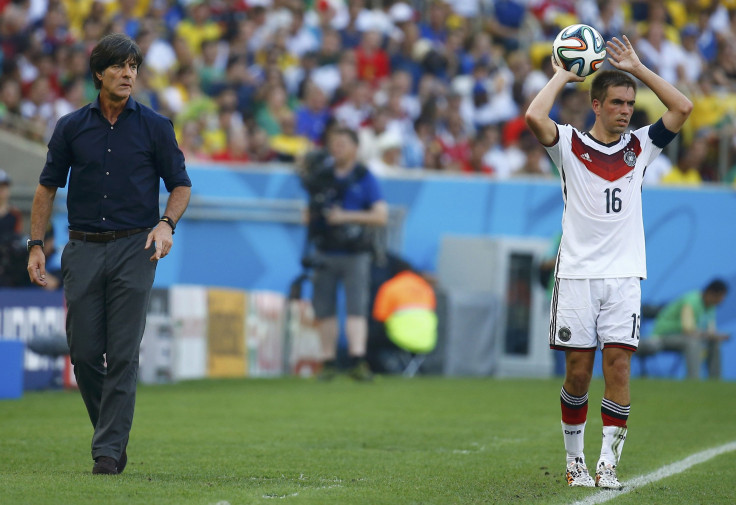Germany World Cup: 2014 Roster Aiming To End Run Of Semifinal Exits; Probable Lineups, Tactical Analysis For Brazil Match

After requiring extra time to nervously come through a Round of 16 match with Algeria, Germany coach Joachim Löw reiterated that in his eyes Philipp Lahm was now a central midfielder.
“I have made my decisions, also regarding Philipp Lahm's position. And I will stand by it until the end,” he told German publication Die Zeit.
One of the world’s best full-backs, Lahm had been successfully converted into a central midfielder by new Bayern Munich coach Pep Guardiola last season. And heading into the World Cup, having lost Ilkay Gundogan to injury and with neither Bastian Schweinsteiger nor Sami Khedira fully fit, Germany’s coach had followed suit.
It was a decision that was about much more than simply where one man would play, however. When Germany’s young side thrilled en route to the semifinals in 2010, hammering England in the second round and Argentina in the quarterfinals, they did so with a classic counter-attacking approach.
Since then, Löw has attempted to make the team more orientated around possession, in the mold of Guardiola’s sides. The positioning of Lahm as the midfield fulcrum to fetch and distribute the ball was a key aspect in this shift. But the plan had its problems. The weakest area of the Germany team was in the very position that Lahm once occupied, with two center-backs required to play at full-back. Meanwhile, a Germany midfield featuring Lahm had plenty of the ball, but it was all-too-often sterile possessions. And in Germany’s first two games of the World Cup, Lahm was caught on the ball, against Portugal leading to a missed chance and against Ghana leading to the concession of a goal.
Following the travails against Algeria, pressure was mounting for Lahm to go back to full-back and Germany to go back to basics. Just a couple of days later after proclaiming that he was sticking to his guns, Löw had a change of mind. Against France in the quarterfinals, Lahm was at right-back, Schweinsteiger anchored midfield behind Khedira and Kroos, and, moving away from the possession-style even more, Miroslav Klose started as an orthodox striker.
It worked as well as Löw could possibly have hoped. Lahm impressed and, crucially, Germany’s midfield was more direct, effective and won the battle with their French counterparts providing the foundation for what was the team’s most assured performance of the competition. It was a team that appeared more comfortable with what they were being asked to do.
With the exception of Klose perhaps being replaced, it will surely be the way that Löw again goes against Brazil in the semifinals. Were Germany to revert to the more methodical possession-based strategy, it would surely play into Brazil’s hands. Brazil is a counter-attacking team, which would have no problem losing the possession battle. The hosts are at their best playing at a high tempo and it is easy to imagine Lahm getting swarmed and coughing up costly turnovers. The presence of Lahm at right-back will make the side more defensively sound against the pace of Brazil’s attacking midfielders. While missing Neymar, Brazil cannot be underestimated and, with William a likely replacement, they will still have ample speed.
Germany’s defense looked far stronger against France, with Mats Hummels returning to replace Per Mertesacker and producing an outstanding performance, not just in scoring the goal but in providing crucial blocks at the other end. But it is a defense that still has its vulnerabilities. Jerome Boateng, while a fine athlete, is not the best decision maker, and Benedikt Höwedes is far from a natural left-back. The high line was caught out far less against France than it had been against Algeria, although France could still have taken advantage had they been more ruthless. Brazil will surely look to target that area, although, in Fred, they lack a striker capable of running in behind. The threat will likely come from wide.
The fact remains that Germany will surely be better placed to avoid a third straight World Cup semifinal exit if they go back to the style more in keeping with the traditional German philosophy. It will then just remain to be seen whether the current players can find the incredible mental toughness of German teams past to get one step closer to ending their recent nearly-men tag.
Probable Lineup
G: Neuer
D: Lahm, Boateng, Hummels, Höwedes
M: Khedira
Schweinsteiger, Kroos
F: Muller, Klose, Özil
© Copyright IBTimes 2025. All rights reserved.





















